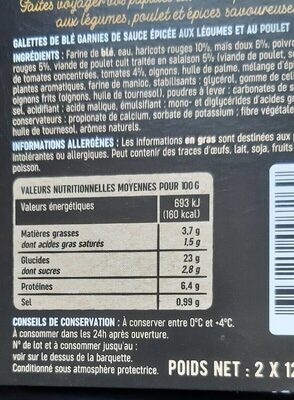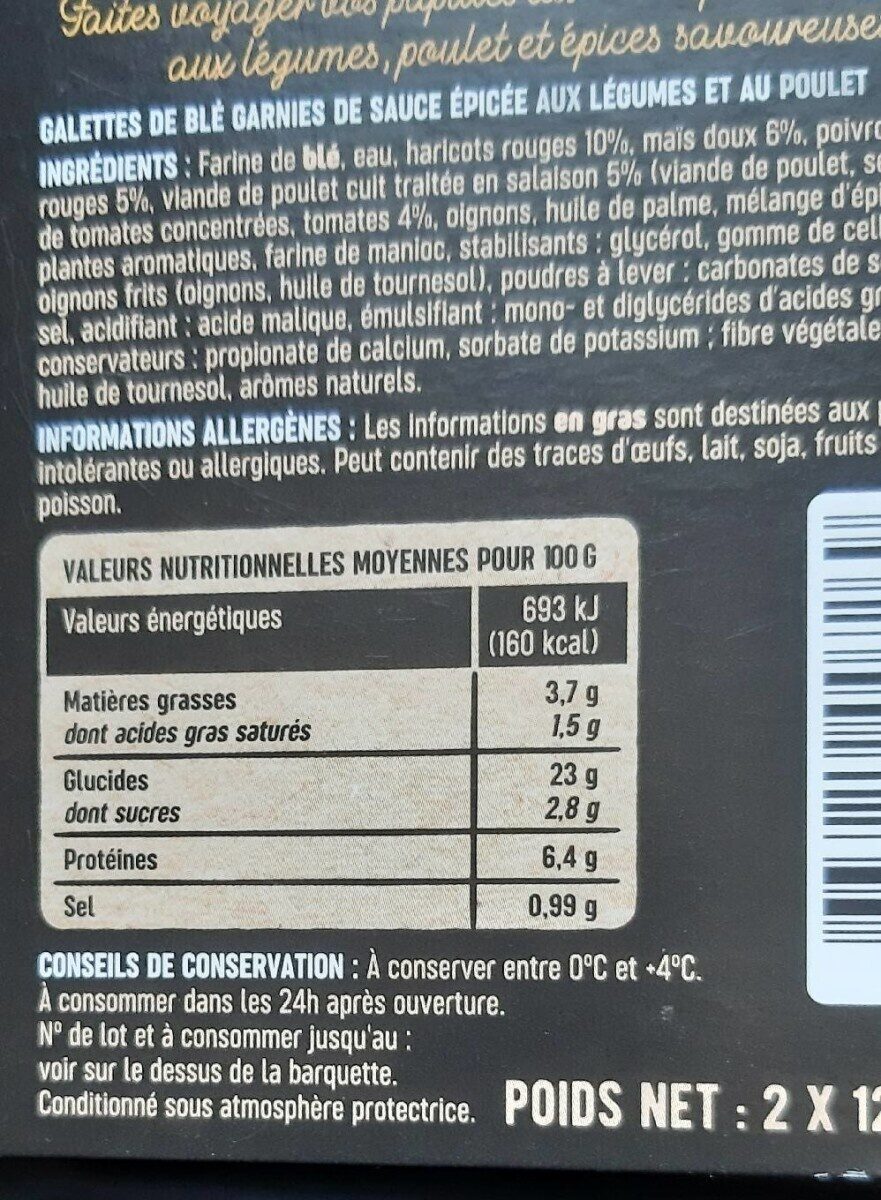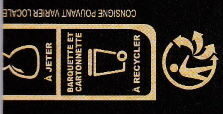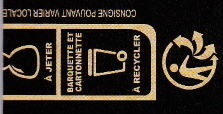Help us make food transparency the norm!
As a non-profit organization, we depend on your donations to continue informing consumers around the world about what they eat.
The food revolution starts with you!
Fajitas à la mexicaine - Dessaint - 240 g
Fajitas à la mexicaine - Dessaint - 240 g
This product page is not complete. You can help to complete it by editing it and adding more data from the photos we have, or by taking more photos using the app for Android or iPhone/iPad. Thank you!
×
Barcode: 3663219007269 (EAN / EAN-13)
Quantity: 240 g
Packaging: Fresh
Brands: Dessaint
Labels, certifications, awards:
Nutriscore, Nutriscore Grade A, Triman
Manufacturing or processing places: France
Stores: Auchan, carrefour.fr
Countries where sold: France
Matching with your preferences
Health
Ingredients
-
29 ingredients
: Farine de blé, eau, haricots rouges 10% mais doux 6%, poivrons verts 6% poivrons rouges 5%, viande de poulet cuit traitée en salaison 5% (viande de poulet sell préparation a base de tomates concentrées, tomates 4%, oignons. huile de palme, mélange d'épices, coriandre plantes aromatiques, farine de manioc, stabilisants: glycérol, gomme de cellulose gomme guar: oignons frits (oignons. huile de tournesol), poudres à lever:carbonates de sodium, diphosphates sel, acidifiant : acide malique, émulsifiant: mono - et diglycérides d'acides gras dextrose conservateurs : propionate de calcium, sorbate de potassium fibre végétale maltodextine, huile de tournesol, arômes naturels.Allergens: GlutenTraces: Celery, Eggs, Fish, Milk, Nuts, Soybeans
Food processing
-
Ultra processed foods
Elements that indicate the product is in the 4 - Ultra processed food and drink products group:
- Additive: E422 - Glycerol
- Additive: E450 - Diphosphates
- Additive: E466 - Sodium carboxy methyl cellulose
- Additive: E471 - Mono- and diglycerides of fatty acids
- Ingredient: Emulsifier
- Ingredient: Flavouring
Food products are classified into 4 groups according to their degree of processing:
- Unprocessed or minimally processed foods
- Processed culinary ingredients
- Processed foods
- Ultra processed foods
The determination of the group is based on the category of the product and on the ingredients it contains.
Additives
-
E202 - Potassium sorbate
Potassium sorbate (E202) is a synthetic food preservative commonly used to extend the shelf life of various food products.
It works by inhibiting the growth of molds, yeast, and some bacteria, preventing spoilage. When added to foods, it helps maintain their freshness and quality.
Some studies have shown that when combined with nitrites, potassium sorbate have genotoxic activity in vitro. However, potassium sorbate is generally recognized as safe (GRAS) by regulatory authorities.
-
E282 - Calcium propionate
Calcium propanoate: Calcium propanoate or calcium propionate has the formula Ca-C2H5COO-2. It is the calcium salt of propanoic acid.Source: Wikipedia
-
E296 - Malic acid
Malic acid: Malic acid is an organic compound with the molecular formula C4H6O5. It is a dicarboxylic acid that is made by all living organisms, contributes to the pleasantly sour taste of fruits, and is used as a food additive. Malic acid has two stereoisomeric forms -L- and D-enantiomers-, though only the L-isomer exists naturally. The salts and esters of malic acid are known as malates. The malate anion is an intermediate in the citric acid cycle.Source: Wikipedia
-
E422 - Glycerol
Glycerol: Glycerol -; also called glycerine or glycerin; see spelling differences- is a simple polyol compound. It is a colorless, odorless, viscous liquid that is sweet-tasting and non-toxic. The glycerol backbone is found in all lipids known as triglycerides. It is widely used in the food industry as a sweetener and humectant and in pharmaceutical formulations. Glycerol has three hydroxyl groups that are responsible for its solubility in water and its hygroscopic nature.Source: Wikipedia
-
E450 - Diphosphates
Diphosphates (E450) are food additives often utilized to modify the texture of products, acting as leavening agents in baking and preventing the coagulation of canned food.
These salts can stabilize whipped cream and are also found in powdered products to maintain their flow properties. They are commonly present in baked goods, processed meats, and soft drinks.
Derived from phosphoric acid, they're part of our daily phosphate intake, which often surpasses recommended levels due to the prevalence of phosphates in processed foods and drinks.
Excessive phosphate consumption is linked to health issues, such as impaired kidney function and weakened bone health. Though diphosphates are generally regarded as safe when consumed within established acceptable daily intakes, it's imperative to monitor overall phosphate consumption to maintain optimal health.
-
E466 - Sodium carboxy methyl cellulose
Carboxymethyl cellulose: Carboxymethyl cellulose -CMC- or cellulose gum or tylose powder is a cellulose derivative with carboxymethyl groups --CH2-COOH- bound to some of the hydroxyl groups of the glucopyranose monomers that make up the cellulose backbone. It is often used as its sodium salt, sodium carboxymethyl cellulose.Source: Wikipedia
-
E471 - Mono- and diglycerides of fatty acids
Mono- and diglycerides of fatty acids (E471), are food additives commonly used as emulsifiers in various processed foods.
These compounds consist of glycerol molecules linked to one or two fatty acid chains, which help stabilize and blend water and oil-based ingredients. E471 enhances the texture and shelf life of products like margarine, baked goods, and ice cream, ensuring a smooth and consistent texture.
It is generally considered safe for consumption within established regulatory limits.
-
E500 - Sodium carbonates
Sodium carbonates (E500) are compounds commonly used in food preparation as leavening agents, helping baked goods rise by releasing carbon dioxide when they interact with acids.
Often found in baking soda, they regulate the pH of food, preventing it from becoming too acidic or too alkaline. In the culinary world, sodium carbonates can also enhance the texture and structure of foods, such as noodles, by modifying the gluten network.
Generally recognized as safe, sodium carbonates are non-toxic when consumed in typical amounts found in food.
Ingredients analysis
-
Palm oil
Ingredients that contain palm oil: Palm oil
-
Non-vegan
Non-vegan ingredients: Chicken meatSome ingredients could not be recognized.
We need your help!
You can help us recognize more ingredients and better analyze the list of ingredients for this product and others:
- Edit this product page to correct spelling mistakes in the ingredients list, and/or to remove ingredients in other languages and sentences that are not related to the ingredients.
- Add new entries, synonyms or translations to our multilingual lists of ingredients, ingredient processing methods, and labels.
If you would like to help, join the #ingredients channel on our Slack discussion space and/or learn about ingredients analysis on our wiki. Thank you!
-
Non-vegetarian
Non-vegetarian ingredients: Chicken meatSome ingredients could not be recognized.
We need your help!
You can help us recognize more ingredients and better analyze the list of ingredients for this product and others:
- Edit this product page to correct spelling mistakes in the ingredients list, and/or to remove ingredients in other languages and sentences that are not related to the ingredients.
- Add new entries, synonyms or translations to our multilingual lists of ingredients, ingredient processing methods, and labels.
If you would like to help, join the #ingredients channel on our Slack discussion space and/or learn about ingredients analysis on our wiki. Thank you!
-
Details of the analysis of the ingredients
We need your help!
Some ingredients could not be recognized.
We need your help!
You can help us recognize more ingredients and better analyze the list of ingredients for this product and others:
- Edit this product page to correct spelling mistakes in the ingredients list, and/or to remove ingredients in other languages and sentences that are not related to the ingredients.
- Add new entries, synonyms or translations to our multilingual lists of ingredients, ingredient processing methods, and labels.
If you would like to help, join the #ingredients channel on our Slack discussion space and/or learn about ingredients analysis on our wiki. Thank you!
: Farine de blé, eau, haricots rouges 10% mais doux 6%, poivrons verts 6% poivrons rouges 5%, viande de poulet 5%, viande de poulet sell préparation a base de tomates concentrées, tomates 4%, oignons, huile de palme, mélange d'épices, coriandre plantes aromatiques, farine de manioc, stabilisants (glycérol), gomme de cellulose gomme guar (oignons (oignons, huile de tournesol)), poudres à lever (carbonates de sodium), diphosphates sel, acidifiant (acide malique), émulsifiant (mono- et diglycérides d'acides gras dextrose conservateurs), propionate de calcium, sorbate de potassium fibre végétale maltodextine, huile de tournesol, arômes naturels- Farine de blé -> en:wheat-flour - vegan: yes - vegetarian: yes - ciqual_proxy_food_code: 9410 - percent_min: 6 - percent_max: 70
- eau -> en:water - vegan: yes - vegetarian: yes - ciqual_food_code: 18066 - percent_min: 6 - percent_max: 38
- haricots rouges 10% mais doux -> fr:haricots-rouges-10-mais-doux - percent_min: 6 - percent: 6 - percent_max: 6
- poivrons verts 6% poivrons rouges -> fr:poivrons-verts-6-poivrons-rouges - percent_min: 5 - percent: 5 - percent_max: 5
- viande de poulet -> en:chicken-meat - vegan: no - vegetarian: no - ciqual_food_code: 36005 - percent_min: 5 - percent: 5 - percent_max: 5
- viande de poulet sell préparation a base de tomates concentrées -> fr:viande-de-poulet-sell-preparation-a-base-de-tomates-concentrees - percent_min: 4 - percent_max: 5
- tomates -> en:tomato - vegan: yes - vegetarian: yes - ciqual_food_code: 20047 - percent_min: 4 - percent: 4 - percent_max: 4
- oignons -> en:onion - vegan: yes - vegetarian: yes - ciqual_food_code: 20034 - percent_min: 0 - percent_max: 4
- huile de palme -> en:palm-oil - vegan: yes - vegetarian: yes - from_palm_oil: yes - ciqual_food_code: 16129 - percent_min: 0 - percent_max: 4
- mélange d'épices -> en:mixed-spices - vegan: yes - vegetarian: yes - percent_min: 0 - percent_max: 4
- coriandre plantes aromatiques -> fr:coriandre-plantes-aromatiques - percent_min: 0 - percent_max: 4
- farine de manioc -> en:cassava-flour - vegan: yes - vegetarian: yes - ciqual_food_code: 54031 - percent_min: 0 - percent_max: 4
- stabilisants -> en:stabiliser - percent_min: 0 - percent_max: 4
- glycérol -> en:e422 - vegan: maybe - vegetarian: maybe - percent_min: 0 - percent_max: 4
- gomme de cellulose gomme guar -> fr:gomme-de-cellulose-gomme-guar - percent_min: 0 - percent_max: 4
- oignons -> en:onion - vegan: yes - vegetarian: yes - ciqual_food_code: 20034 - percent_min: 0 - percent_max: 4
- oignons -> en:onion - vegan: yes - vegetarian: yes - ciqual_food_code: 20034 - percent_min: 0 - percent_max: 4
- huile de tournesol -> en:sunflower-oil - vegan: yes - vegetarian: yes - from_palm_oil: no - ciqual_food_code: 17440 - percent_min: 0 - percent_max: 2
- oignons -> en:onion - vegan: yes - vegetarian: yes - ciqual_food_code: 20034 - percent_min: 0 - percent_max: 4
- poudres à lever -> en:raising-agent - percent_min: 0 - percent_max: 4
- carbonates de sodium -> en:e500 - vegan: yes - vegetarian: yes - percent_min: 0 - percent_max: 4
- diphosphates sel -> fr:diphosphates-sel - percent_min: 0 - percent_max: 4
- acidifiant -> en:acid - percent_min: 0 - percent_max: 4
- acide malique -> en:e296 - vegan: yes - vegetarian: yes - percent_min: 0 - percent_max: 4
- émulsifiant -> en:emulsifier - percent_min: 0 - percent_max: 4
- mono- et diglycérides d'acides gras dextrose conservateurs -> fr:mono-et-diglycerides-d-acides-gras-dextrose-conservateurs - percent_min: 0 - percent_max: 4
- propionate de calcium -> en:e282 - vegan: yes - vegetarian: yes - percent_min: 0 - percent_max: 4
- sorbate de potassium fibre végétale maltodextine -> fr:sorbate-de-potassium-fibre-vegetale-maltodextine - percent_min: 0 - percent_max: 3.88888888888889
- huile de tournesol -> en:sunflower-oil - vegan: yes - vegetarian: yes - from_palm_oil: no - ciqual_food_code: 17440 - percent_min: 0 - percent_max: 3.68421052631579
- arômes naturels -> en:natural-flavouring - vegan: maybe - vegetarian: maybe - percent_min: 0 - percent_max: 3.5
Nutrition
-
Average nutritional quality
⚠ ️Warning: the amount of fiber is not specified, their possible positive contribution to the grade could not be taken into account.⚠ ️Warning: the amount of fruits, vegetables and nuts is not specified on the label, it was estimated from the list of ingredients: 7This product is not considered a beverage for the calculation of the Nutri-Score.
Positive points: 3
- Proteins: 3 / 5 (value: 6.4, rounded value: 6.4)
- Fiber: 0 / 5 (value: 0, rounded value: 0)
- Fruits, vegetables, nuts, and colza/walnut/olive oils: 0 / 5 (value: 7.75, rounded value: 7.8)
Negative points: 7
- Energy: 2 / 10 (value: 693, rounded value: 693)
- Sugars: 0 / 10 (value: 2.8, rounded value: 2.8)
- Saturated fat: 1 / 10 (value: 1.5, rounded value: 1.5)
- Sodium: 4 / 10 (value: 396, rounded value: 396)
The points for proteins are counted because the negative points are less than 11.
Nutritional score: (7 - 3)
Nutri-Score:
-
Nutrient levels
-
Fat in moderate quantity (3.7%)
What you need to know- A high consumption of fat, especially saturated fats, can raise cholesterol, which increases the risk of heart diseases.
Recommendation: Limit the consumption of fat and saturated fat- Choose products with lower fat and saturated fat content.
-
Saturated fat in moderate quantity (1.5%)
What you need to know- A high consumption of fat, especially saturated fats, can raise cholesterol, which increases the risk of heart diseases.
Recommendation: Limit the consumption of fat and saturated fat- Choose products with lower fat and saturated fat content.
-
Sugars in low quantity (2.8%)
What you need to know- A high consumption of sugar can cause weight gain and tooth decay. It also augments the risk of type 2 diabetes and cardio-vascular diseases.
Recommendation: Limit the consumption of sugar and sugary drinks- Sugary drinks (such as sodas, fruit beverages, and fruit juices and nectars) should be limited as much as possible (no more than 1 glass a day).
- Choose products with lower sugar content and reduce the consumption of products with added sugars.
-
Salt in moderate quantity (0.99%)
What you need to know- A high consumption of salt (or sodium) can cause raised blood pressure, which can increase the risk of heart disease and stroke.
- Many people who have high blood pressure do not know it, as there are often no symptoms.
- Most people consume too much salt (on average 9 to 12 grams per day), around twice the recommended maximum level of intake.
Recommendation: Limit the consumption of salt and salted food- Reduce the quantity of salt used when cooking, and don't salt again at the table.
- Limit the consumption of salty snacks and choose products with lower salt content.
-
-
Nutrition facts
Nutrition facts As sold
for 100 g / 100 mlCompared to: Fajitas Energy 693 kj
(160 kcal)-17% Fat 3.7 g -21% Saturated fat 1.5 g +35% Carbohydrates 23 g -16% Sugars 2.8 g -32% Fiber ? Proteins 6.4 g -18% Salt 0.99 g -51% Fruits‚ vegetables‚ nuts and rapeseed‚ walnut and olive oils (estimate from ingredients list analysis) 7.75 % Carbon footprint from meat or fish 24.5 g
Environment
-
Eco-Score C - Moderate environmental impact
⚠ ️Select a country in order to include the full impact of transportation.The Eco-Score is an experimental score that summarizes the environmental impacts of food products.→ The Eco-Score was initially developped for France and it is being extended to other European countries. The Eco-Score formula is subject to change as it is regularly improved to make it more precise and better suited to each country.Life cycle analysis
-
Average impact of products of the same category: B (Score: 68/100)
Category: Fajitas
Category: Fajitas
- PEF environmental score: 0.36 (the lower the score, the lower the impact)
- including impact on climate change: 2.47 kg CO2 eq/kg of product
Stage Impact Agriculture
63.5 %Processing
15.5 %Packaging
2.9 %Transportation
6.0 %Distribution
2.5 %Consumption
9.5 %
Bonuses and maluses
-
Missing origins of ingredients information
Malus: -5
⚠ ️ The origins of the ingredients of this product are not indicated.
If they are indicated on the packaging, you can modify the product sheet and add them.
If you are the manufacturer of this product, you can send us the information with our free platform for producers.
-
Ingredients that threatens species
Malus: -10
Contains palm oil
Tropical forests in Asia, Africa and Latin America are destroyed to create and expand oil palm tree plantations. The deforestation contributes to climate change, and it endangers species such as the orangutan, the pigmy elephant and the Sumatran rhino.
-
Packaging with a low impact
Malus: -3
Shape Material Recycling Impact 1 Film Plastic Discard High 1 Tray Cardboard Recycle Low 1 Card Cardboard Recycle Low
Eco-Score for this product
-
Impact for this product: C (Score: 50/100)
Product: Fajitas à la mexicaine - Dessaint - 240 g
Life cycle analysis score: 68
Sum of bonuses and maluses: -18
Final score: 50/100
-
Carbon footprint
-
Equal to driving 1.3 km in a petrol car
247 g CO² per 100g of product
The carbon emission figure comes from ADEME's Agribalyse database, for the category: Fajitas (Source: ADEME Agribalyse Database)
Stage Impact Agriculture
62.9 %Processing
16.8 %Packaging
4.2 %Transportation
10.8 %Distribution
1.5 %Consumption
3.8 %
Packaging
-
Packaging with a low impact
-
Packaging parts
1 x Tray (Cardboard)
1 x Card (Cardboard)
1 x Film (Plastic)
-
Packaging materials
Material % Packaging weight Packaging weight per 100 g of product Paper or cardboard Plastic Total
-
Transportation
-
Origins of ingredients
Missing origins of ingredients information
⚠ ️ The origins of the ingredients of this product are not indicated.
If they are indicated on the packaging, you can modify the product sheet and add them.
If you are the manufacturer of this product, you can send us the information with our free platform for producers.Add the origins of ingredients for this product Add the origins of ingredients for this product
Threatened species
-
Contains palm oil
Drives deforestation and threatens species such as the orangutan
Tropical forests in Asia, Africa and Latin America are destroyed to create and expand oil palm tree plantations. The deforestation contributes to climate change, and it endangers species such as the orangutan, the pigmy elephant and the Sumatran rhino.
Report a problem
-
Incomplete or incorrect information?
Category, labels, ingredients, allergens, nutritional information, photos etc.
If the information does not match the information on the packaging, please complete or correct it. Open Food Facts is a collaborative database, and every contribution is useful for all.
Data sources
Product added on by kiliweb
Last edit of product page on by kiliweb.
Product page also edited by cbprimula, driveoff, packbot, roboto-app, yuka.sY2b0xO6T85zoF3NwEKvlhcZXN7wkjTFFAf5nU2snf60CrLreM0s6Yr1KKg, yuka.sY2b0xO6T85zoF3NwEKvllFGX9XZoQrPPDfuwEPW59OJF4HWfMhPs9mqEas.












